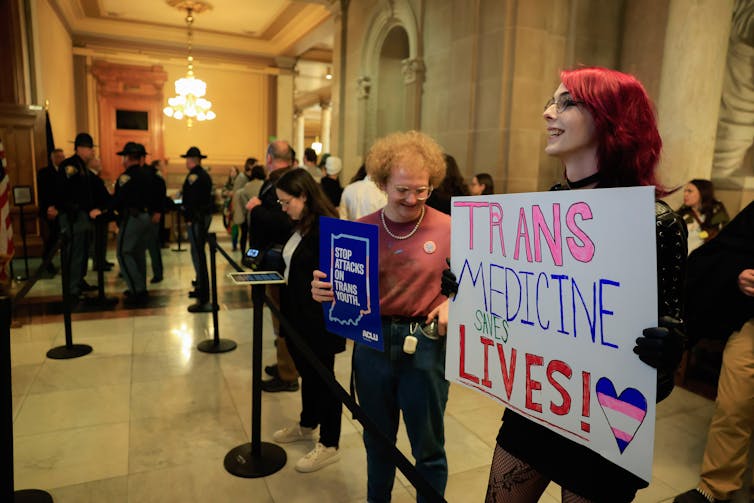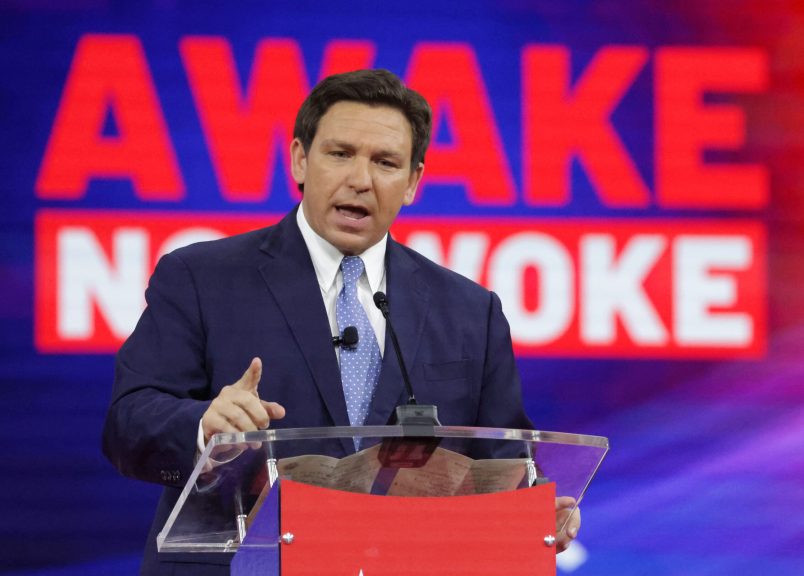This article is part of TPM Cafe, TPM’s home for opinion and news analysis. It was originally published at The Conversation.
Nearly 500 anti-LGBTQ bills have been introduced in state legislatures in the U.S. in 2023. Many of those bills seek to reduce or eliminate gender-affirming care for transgender minors or to ban drag performances in places where minors could view them.
Most of those bills have not become law. But many of those that have did not survive legal scrutiny when challenged in court.
Anti-LGBTQ laws that federal judges have concluded do not pass constitutional scrutiny include anti-trans legislation in Arkansas and anti-drag legislation in Tennessee.
A notable feature of these rulings for me — a First Amendment scholar — is how many rely on the First Amendment’s protection of free speech. In several of the decisions, judges used harsh language to describe what they deemed to be assaults on a fundamental American right.
Here’s a summary of some of the most notable legal outcomes:
Drag performances
Several states passed laws aimed at restricting drag performances. These laws were quickly challenged in court. So far, judges have sided with those challenging these laws.
On June 2, 2023, a federal judge permanently enjoined Tennessee’s attempt to limit drag performances by restricting “adult entertainment” featuring “male or female impersonators.” When a law is permanently enjoined, it can no longer be enforced unless an appeals court reverses the decision.
The judge ruled on broad grounds that Tennessee’s law violated freedom of speech, writing that it “reeks with constitutional maladies of vagueness and overbreadth fatal to statutes that regulate First Amendment rights.” He also ruled that the law was passed for the “impermissible purpose of chilling constitutionally-protected speech” and that it engaged in viewpoint discrimination, which occurs when a law regulates speech from a disfavored perspective.
Three weeks later, a federal judge granted a temporary injunction against Florida’s anti-drag law on similar broad grounds.
And in Utah, a federal judge required the city of St. George to grant a permit for a drag show, ruling that the city had applied an ordinance in a discriminatory manner in order to prevent the family-friendly drag show from happening. As in the other cases, the judge’s ruling was based on First Amendment precedent.
Gender-affirming care
On June 20, 2023, a federal judge permanently enjoined an Arkansas law, passed in 2021 over the veto of then-Gov. Asa Hutchinson, preventing transgender minors from receiving various kinds of gender-affirming medical care, including puberty blockers and hormone therapy.
The judge held that Arkansas’ law violated the Fourteenth Amendment’s equal protection clause — which ensures laws are applied equally regardless of social characteristics like race or gender — because the law discriminated on the basis of sex.
Arkansas claimed its law was passed in order to protect children and to safeguard medical ethics. The judge agreed that these were legitimate state interests, but rejected Arkansas’ claim that its law furthered those ends.
The judge also held that Arkansas’ law violated the First Amendment free speech rights of medical care providers because the law would have prevented them from providing referrals for gender transition medical treatment.
During June 2023, federal judges in Florida and Indiana granted temporary injunctions against enforcement of similar state laws. This means that these laws cannot be enforced until a full trial is conducted — and only if that trial results in a ruling that these laws are constitutional.

Free speech for the LGBTQ community
In striking down these unconstitutional state laws on First Amendment grounds, many judges went out of their way to reinforce the point that freedom of speech protects views about sexual orientation and gender identity that may be unpopular in conservative areas.
In his ruling on the St. George, Utah case, U.S. District Judge David Nuffer stressed that “Public spaces are public spaces. Public spaces are not private spaces. Public spaces are not majority spaces. The First Amendment of the United States Constitution ensures that all citizens, popular or not, majority or minority, conventional or unconventional, have access to public spaces for public expression.”
Nuffer also noted that “Public officials and the city governments in which they serve are trustees of constitutional rights for all citizens.” Protecting the constitutional rights of all citizens includes protecting the constitutional rights of members of the LGBTQ community and of other gender-nonconforming people.
Free speech rights also extend to those who want to use speech in order to help promote the well-being of LGBTQ people. In ruling that Arkansas’ law violated the First Amendment, Judge Jay Moody stated that the state law “prevents doctors from informing their patients where gender transition treatment may be available” and that it “effectively bans their ability to speak to patients about these treatments because the physician is not allowed to tell their patient where it is available.” For this reason, he held that the law violated the First Amendment.
As additional anti-LGBTQ state laws are challenged in court, judges are likely to continue to use the First Amendment to show how such laws fail to respect Americans’ fundamental free speech rights.
This article is republished from The Conversation under a Creative Commons license. Read the original article.







In a similar situation, the Supreme Court ruled that the free speech rights of a bigot are more equal than the 14th Amendment rights of a gay couple. One of these things is not exactly like the others. Now it’s time to head up the Big Thompson.
Dang the Liberals. Always hiding behind the Constitution.
In any case it will ultimately be up to the 6
JusticesOperatives to decide if LBTGQ are full citizens. If they rule against them (and the 1st Amendment) I can’t wait to see what smooth line of legal bullsh*t they use to justify transphobia.Ironic to see all these hateful motherfucking free-speech advocates who want to know why they can’t use hate speech keep getting shut down for limiting free speech.
Fluffing the Aged and Godly: My Path to World Domination.
The Ron DeSantis Story.
Related: